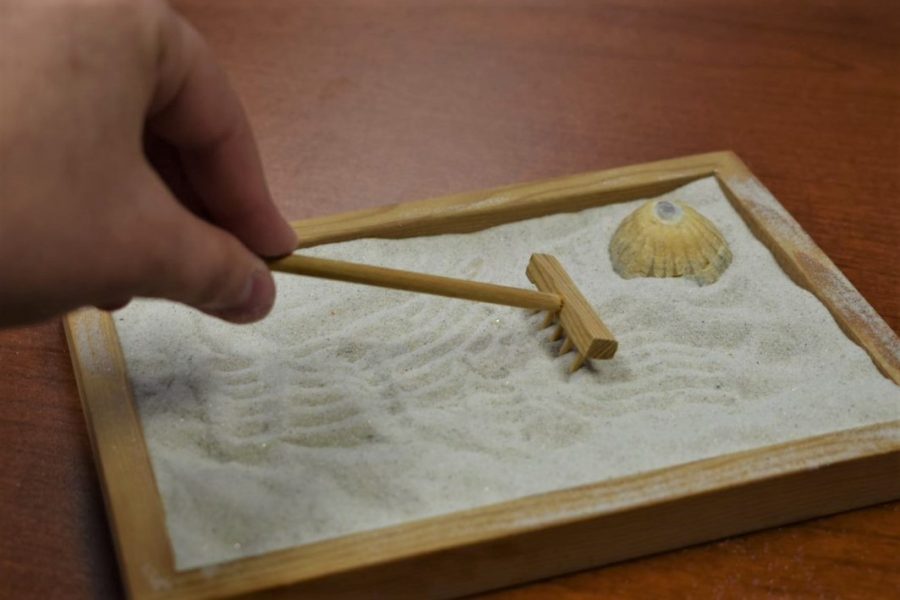Midterm Stress Relief
October 15, 2019
Lakeland students and counselors share some ideas of what students can try to relieve stress during midterms.
According to the Jed Foundation, in recent studies, 80% of college students said they felt “overwhelmed” at times with all they were juggling: school, work, finances, relationships and more.
“If you feel stressed, you are not alone!” says Alex Liosatos, Lakeland’s licensed professional counselor and director of the health and counseling center.
“Stress manifests differently in different people but there are some physical and psychological signs to watch out for,” explained Liosatos. Physical symptoms may include, “low energy, headaches, stomach aches, nausea, insomnia, chest pain, and frequent colds or other viruses.” Some psychological symptoms might be, “worsening or new symptoms of depression or anxiety, difficulty concentrating, irritability, anger, frustration, overthinking, and/or withdrawing socially.”
Alex has recommended some simple yet effective ways anyone can try to reduce their stress. Taking breaks, especially from studying, “allows us to be more productive and reduce overwhelming feelings.”
Sophomore, Stenisha Bowen, enjoys “listening to music” and taking time out for herself.
Not only should you make time for yourself but make time to socialize and hang out with friends. “Laugh often,” says Liosatos. “This also increases the release of endorphins in the brain.” She finds YouTube or TV are great places to find hilarious entertainment.
Transfer student, Mikayil Abaszada, has found being around others and being involved on campus is a great release for him. Christine Jenkins, another counselor at Lakeland, admitted she enjoys watching reality tv.
Liosatos added it is important to maintain a healthy diet and meal schedule. We may crave caffeine, alcohol or sugar in times of stress, but the effects are only temporary. Consuming increased amounts of these can actually make symptoms worse, so it is better to lower the amount. Increasing the intake of fruits and vegetables can also be beneficial. Liosatos said, “Be aware of changes in eating and eating habits and become mindful of how you fuel your body.”
Liosatos recommends doing, “Any kind of exercise that increases heart rate. This reduces stress and causes the body to release chemicals called endorphins which reduce the perception of pain, while also triggering positive feelings in the body.” On the other hand, rest is also important. “A lack of sleep can intensify the physical and psychological symptoms of stress.” She suggests, “Try to create a bedtime routine to prep the body for sleep.”
Britta, Lakeland’s Safe Harbor advocate, said she, “takes walks with her dog.” While sophomore, Jasmine Smith, found dance to be a great form of exercise.
Lastly, Liosatos warns, “don’t allow your self-care efforts to be derailed by the lifestyle choices or inappropriate emotional support needs of others… Learn to say no.”
Students are encouraged to visit the counseling center and use the resources available to help with stress as well as participate in a variety of weekly programs.
If students are interested in yoga, on Tuesdays Liz Licht leads a 30-min session in the Ley Chapel from 11:30 a.m. to 12 p.m. and Jenny Tanck leads a session from 5 to 6 p.m.
On Wednesdays, there is meditation in the chapel from 12 to 12:30 p.m. At night, Christine and Britta have Cookies and Chat from 5 to 6 p.m.
The Mindfulness of the Body program is held from 12 to 12:30 p.m. in the Ley Chapel on Thursdays. Also, resilience skills classes are being taught on Thursdays from 6:30 to 7:30 p.m. and Fridays 11:30 a.m. to 12:30 p.m. in the Brotz multi-purpose room.
Students are welcome to make an appointment or attend walk-in hours to talk with any of the counselors about stress or other concerns. Visit them in Brotz or you can call the front desk at 920–565-1034 ext. 2386.


